 Illegal music downloaders shell out more for legitimate music downloads than goody two-shoes music fans.
Illegal music downloaders shell out more for legitimate music downloads than goody two-shoes music fans.
The results of the ‘2005 Speakerbox’ study by market researchers The Leading Question revealed that music fans who download music illegally via file-sharing networks also fork out four-and-a-half times more on legitimate music downloads than average fans.
The survey asked 600 British PC and mobile-owning British music fans about their downloading activities and discovered that music pirates spend substantially more on legally downloadable music through sites like Apple’s iTunes Music Store or Napster
According to the report, pirates who regularly download or share unlicensed music spend an average of £5.52 (~US$9.63, ~€7.99) per month on legal digital music, while average music fans only spend £1.27 (~US$2.21, ~€1.84) on digital tracks.
 How much both groups spend on CDs wasn’t specified.
How much both groups spend on CDs wasn’t specified.
“Music fans who break piracy laws are highly valuable customers,” said Paul Brindley, director of The Leading Question.
“Legal actions are making something of an impact but unlicensed file sharing will never be eradicated. The smart response is to capitalise on the power of the p2p networks themselves to entice consumers into more attractive legal alternatives,” he added.
The research also revealed that illegal downloaders were mustard keen to try emerging music services, with 60% wanting to get their hands on a MP3-enabled phone, compared to just 29% of other music fans.
“There’s a myth that all illegal downloaders are mercenaries hell-bent on breaking the law in pursuit of free music,” Brindley continued. “In reality, they are often hardcore fans who are extremely enthusiastic about adopting paid-for services as long as they are suitably compelling.”
The survey highlighted that phones still have some way to go before they can compete with dedicated MP3 players as de-facto music playing devices.
Only 8% of punters surveyed were planning to buy a music playing mobile phone in the next 12 months, compared to 33% ready to rip out the readies for an iPod or dedicated MP3 player during the same period.
 Respondents cited built-in cameras, organiser functions and video cameras above music players in their preferences for mobile phone features.
Respondents cited built-in cameras, organiser functions and video cameras above music players in their preferences for mobile phone features.
Punters expressed concern about the low battery life of music playing phones, with some fearful of losing their music collection if they lost their phone.
With many consumers getting their phones for nowt through contract deals – and often replacing them regularly – the survey concluded that most punters have a low “emotional attachment” to their phones.
Despite this, 38% of those surveyed liked the idea of downloading full-length tracks direct to their mobiles, with the figure rising to over 50% for punters already downloading tracks to their computers.
Mobile phone manufacturers trying to tempt new users with bigger onboard memory will note that only 4% of the survey respondents wanted more than 1,000 songs worth of music to take with them on holiday.
Online file sharers ‘buy more music’ [Guardian]
The Leading Edge
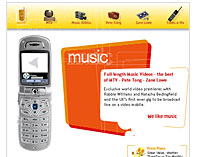 Mobile operator 3 has announced a partnership with EMI Music UK to supply full-length music tracks directly to the three million customers on their network.
Mobile operator 3 has announced a partnership with EMI Music UK to supply full-length music tracks directly to the three million customers on their network. The agreement will also enable customers to access music from EMI’s other UK labels which include Parlophone, Relentless and Virgin with the “hottest and freshest” 100 EMI Music UK’s tracks made available for downloading in either WMA or AAC format (depending on the handset).
The agreement will also enable customers to access music from EMI’s other UK labels which include Parlophone, Relentless and Virgin with the “hottest and freshest” 100 EMI Music UK’s tracks made available for downloading in either WMA or AAC format (depending on the handset).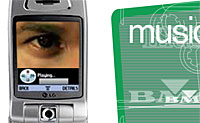 In a flurry of synergetic deals, Robbie Williams launched his single “Misunderstood” on the 3 network before it had been heard on TV or radio and Natasha Bedingfield and Rooster have also streamed concerts live to 3’s customers.
In a flurry of synergetic deals, Robbie Williams launched his single “Misunderstood” on the 3 network before it had been heard on TV or radio and Natasha Bedingfield and Rooster have also streamed concerts live to 3’s customers. With the slap of a leather gauntlet against iPod’s shiny white face, Creative has unveiled its new Zen Vision a portable media player.
With the slap of a leather gauntlet against iPod’s shiny white face, Creative has unveiled its new Zen Vision a portable media player. The Zen Vision supports a slew of video codecs, including AVI, DivX, XviD, MPEG-1, MPEG-2, MPEG4-SP and Microsoft’s WMV9.
The Zen Vision supports a slew of video codecs, including AVI, DivX, XviD, MPEG-1, MPEG-2, MPEG4-SP and Microsoft’s WMV9. Resplendent in its white or black finishes, the Zen is quite a looker, and is only slightly larger than the rival iPod.
Resplendent in its white or black finishes, the Zen is quite a looker, and is only slightly larger than the rival iPod. The pocket sized powerhouse comes with a rechargeable Li-ion battery offering up to 4.5 hours of video playback and 13 hours of audio, depending on the file’s format and energy settings.
The pocket sized powerhouse comes with a rechargeable Li-ion battery offering up to 4.5 hours of video playback and 13 hours of audio, depending on the file’s format and energy settings. The BBC’s online coverage of Live 8 in July notched up a record volume of Web traffic on their radio and music Websites.
The BBC’s online coverage of Live 8 in July notched up a record volume of Web traffic on their radio and music Websites. The latest figures for the BBC’s online traffic also show a healthy boost in figures for their sports coverage on the Radio Five Live Website, with 910,841 unique users being recorded during June, compared with 840,019 the same period in 2004.
The latest figures for the BBC’s online traffic also show a healthy boost in figures for their sports coverage on the Radio Five Live Website, with 910,841 unique users being recorded during June, compared with 840,019 the same period in 2004. It was mainly good news elsewhere, with Radio 1, Radio 2, Radio 3, Radio 4, 1Xtra, Asian Network and BBC 7 all increasing their unique users compared to the same period last year, with only 6 Music – one of our favourites – letting the side down with a disappointing slump from 418,729 to 356,564.
It was mainly good news elsewhere, with Radio 1, Radio 2, Radio 3, Radio 4, 1Xtra, Asian Network and BBC 7 all increasing their unique users compared to the same period last year, with only 6 Music – one of our favourites – letting the side down with a disappointing slump from 418,729 to 356,564. MTV is in the mood to get all interactive with its audience with the launch of MTV: starzine, a new online magazine designed to give “music wannabies the opportunity to realise their dreams of becoming an MTV star.”
MTV is in the mood to get all interactive with its audience with the launch of MTV: starzine, a new online magazine designed to give “music wannabies the opportunity to realise their dreams of becoming an MTV star.” In another cunning ploy to keep users coming back for more, users will earn points for interacting with the magazine and the more material they shunt online and the bigger the audience, the more points they amass.
In another cunning ploy to keep users coming back for more, users will earn points for interacting with the magazine and the more material they shunt online and the bigger the audience, the more points they amass. The all-blinking, Flash-tastic, David Carson ‘tribute’ site lets users upload unlimited images as well as text on to the magazine, with the facility to directly submit photographs taken on a cameraphone.
The all-blinking, Flash-tastic, David Carson ‘tribute’ site lets users upload unlimited images as well as text on to the magazine, with the facility to directly submit photographs taken on a cameraphone. Following a long tradition of The Man stealing ideas off the street to flog their products, T-Mobile is organising a series of impromptu ‘street gigs’ to promote their new Sony Ericsson D750i camera phone.
Following a long tradition of The Man stealing ideas off the street to flog their products, T-Mobile is organising a series of impromptu ‘street gigs’ to promote their new Sony Ericsson D750i camera phone. Keen to milk every last ounce of PR potential from the gigs, T-Mobile will be broadcasting the performances online, with company bods on hand to encourage T-Mobile subscribers to test the new handset
Keen to milk every last ounce of PR potential from the gigs, T-Mobile will be broadcasting the performances online, with company bods on hand to encourage T-Mobile subscribers to test the new handset  “T-Mobile Street Gigs is the first of our new initiatives to deliver unique experiences for customers,” grooved Phil Chapman, UK marketing director, loosening his tie and turning down the David Gray.
“T-Mobile Street Gigs is the first of our new initiatives to deliver unique experiences for customers,” grooved Phil Chapman, UK marketing director, loosening his tie and turning down the David Gray. Illegal music downloaders shell out more for legitimate music downloads than goody two-shoes music fans.
Illegal music downloaders shell out more for legitimate music downloads than goody two-shoes music fans.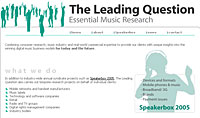 How much both groups spend on CDs wasn’t specified.
How much both groups spend on CDs wasn’t specified.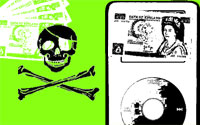 Respondents cited built-in cameras, organiser functions and video cameras above music players in their preferences for mobile phone features.
Respondents cited built-in cameras, organiser functions and video cameras above music players in their preferences for mobile phone features. The rurmour mill continues to hum with speculation that Apple are set to introduce a video playing iPod-like device in the near future.
The rurmour mill continues to hum with speculation that Apple are set to introduce a video playing iPod-like device in the near future. This has led to speculation that the company will be revising the iPod to create something like the ‘vPod’, a concept device created by design firm Pentagram which was published in Business 2.0 Magazine in March.
This has led to speculation that the company will be revising the iPod to create something like the ‘vPod’, a concept device created by design firm Pentagram which was published in Business 2.0 Magazine in March. The big problem with trying to create a multimedia device is that people demand quite different things for mobile audio and video.
The big problem with trying to create a multimedia device is that people demand quite different things for mobile audio and video. The Apple rumour mill has been cranking into overdrive over the weekend after Forbes reported that the company may be considering becoming a mobile phone operator.
The Apple rumour mill has been cranking into overdrive over the weekend after Forbes reported that the company may be considering becoming a mobile phone operator. However, a report in the Sunday Telegraph yesterday claimed that Motorola will finally “unveil the first fruits of its partnership with Apple next month with the launch of its iTunes mobile phone at the V Festival.” The festival runs from 20th to 21st August 2005.
However, a report in the Sunday Telegraph yesterday claimed that Motorola will finally “unveil the first fruits of its partnership with Apple next month with the launch of its iTunes mobile phone at the V Festival.” The festival runs from 20th to 21st August 2005. The UK record industry trade association the BPI has revealed that download sales in 2005 have raced past the ten-million mark – almost twice the amount for the whole of 2004.
The UK record industry trade association the BPI has revealed that download sales in 2005 have raced past the ten-million mark – almost twice the amount for the whole of 2004. Illegal music downloads remain a thorn in the side of the industry, but the growth in legal downloads now outstrips the growth in dodgy file sharing with Jamieson adding, “The battle against illegal files-haring will continue, but we are delighted to have hit this milestone so soon”.
Illegal music downloads remain a thorn in the side of the industry, but the growth in legal downloads now outstrips the growth in dodgy file sharing with Jamieson adding, “The battle against illegal files-haring will continue, but we are delighted to have hit this milestone so soon”.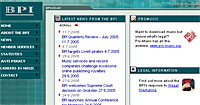 The resurgence of vinyl has been attributed to British indie and rock acts love affair with their near ancient format, with bands like Iron Maiden’s, Libertines, Babyshambles, Kaiser Chiefs and Franz Ferdinand all releasing songs on vinyl.
The resurgence of vinyl has been attributed to British indie and rock acts love affair with their near ancient format, with bands like Iron Maiden’s, Libertines, Babyshambles, Kaiser Chiefs and Franz Ferdinand all releasing songs on vinyl. The European Commission announced yesterday that it wants to give a boot up the backside of the European market for online music services by making it easier for new providers to get licences to flog songs over the Internet.
The European Commission announced yesterday that it wants to give a boot up the backside of the European market for online music services by making it easier for new providers to get licences to flog songs over the Internet.